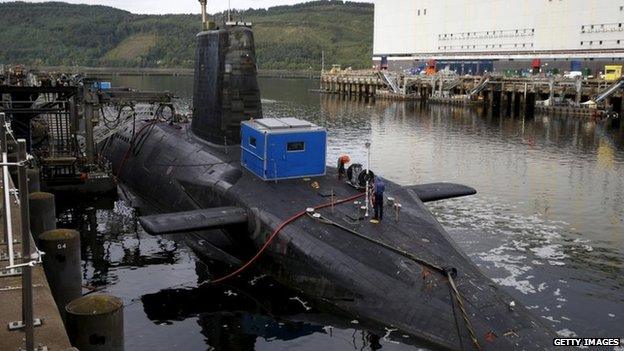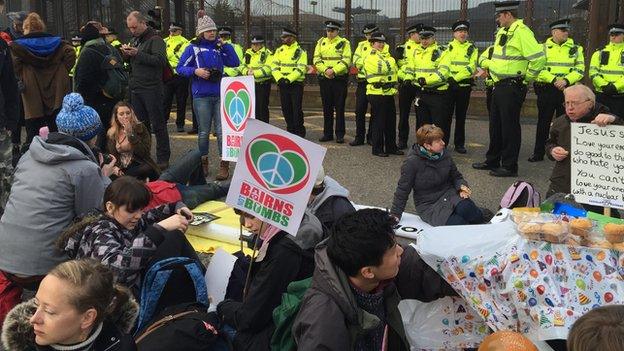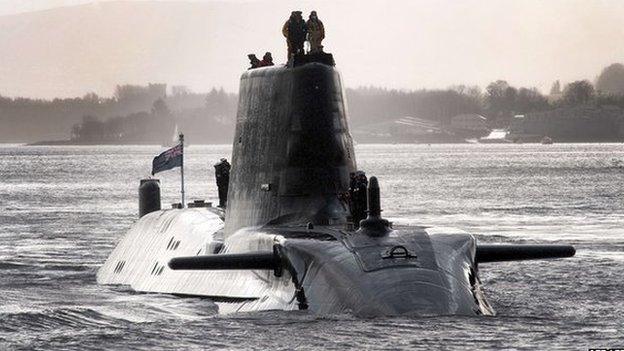Faslane contracts reignite row over Trident renewal
- Published
- comments

Faslane is home to the Trident nuclear submarine fleet
Chancellor George Osborne has been accused of "arrogance" after announcing more than £500m of contracts for the Royal Navy's submarine base at Faslane.
The UK government said the work, which is due to begin in 2017, would secure 6,700 jobs and create thousands more.
Mr Osborne told BBC Radio Scotland that the investment was a "massive boost for Scotland and the UK's defence".
First Minister Nicola Sturgeon said it was "arrogant" to pre-empt parliament's decision on the replacement of Trident.
The new contracts will include the building of ship lifts, sea walls, jetties and other major projects over the next 10 years.
The announcement followed the Conservative chancellor's pledge in the summer Budget to maintain the Nato commitment to spending at least 2% of GDP annually on defence.
George Osborne says the £500m investment in Faslane is essential for defence and the economy
Faslane on the Clyde is home to the Navy's fleet of Trident nuclear submarines and is the largest military establishment in Scotland.
Alongside Portsmouth and Devonport, it is one of three major naval hubs.

What do we know about Faslane on the Clyde?
Faslane is one of the Royal Navy's three main operating bases, alongside HMNB Devonport and HMNB Portsmouth.
It is best known as the home of the UK's four Vanguard-class nuclear-armed submarines which carry Trident II D-5 ballistic missiles.
About 3,000 service personnel are based at Faslane along with 800 family members and approximately 4,000 civilian workers.
The future of the base became a key battleground ahead of last year's Scottish independence referendum.
The four Trident-armed Vanguard submarines are due to retire by 2028, although the missiles they carry will have their operational lives extended to 2042.
Work has already started on designing a replacement system, which would enter service between 2028 and 2035, but a final decision has yet to be taken.

From 2020, Faslane will be the Royal Navy's "Submarine Centre of Specialisation" which means all of the UK's underwater capability will be based in Scotland.
The Ministry of Defence also expect to base Successor class submarines at Faslane when they come into service from 2028.
Nicola Sturgeon described George Osborne's Faslane announcement as "arrogant" and pre-emptive of a vote
The base currently hosts about 6,700 military and civilian staff and contractors, but that figure is expected to increase to about 8,200 by 2022.
The chancellor, who was at Faslane on Monday, told BBC Radio Scotland's Good Morning Scotland programme: "This is a huge investment in jobs, it will secure the 6,500 jobs already here and actually increase the number of jobs to around 8,000 - a massive boost for Scotland and the UK's defence."
He added: "In an uncertain world are we really content to throw away Britain's ultimate insurance policy? These new Trident subs when they come are going to be with us for decades."
Writing in the Sun newspaper, Mr Osborne said the political consensus that Britain needed a nuclear deterrent "risks being shattered again by an unholy alliance of Labour's left-wing insurgents and the Scottish nationalists".
'Insurance policy'
"Some have been tempted to treat the Labour leadership contest as a bit of a joke. On the contrary, I think we should take it deadly seriously," he said.
"For the new unilateralists of British politics are a threat to our future national security. In a world that's getting more dangerous it would be disastrous for Britain to throw away the ultimate insurance policy that keeps us free and safe."
Ms Sturgeon said: "I want to see Faslane have a strong future as a conventional naval base, but this is an arrogant decision by the chancellor to try to pre-empt parliament's decision on the replacement of Trident.
John Ainslie, Scottish CND: Osborne 'ignoring' Holyrood
And she added: "If the chancellor's got £500m to spend then I think he'd be better advised to spend it on health, education, giving young people the best start in life and reversing some of his cruel attacks on the most vulnerable."
Earlier, Deputy First Minister John Swinney told BBC Radio Scotland's Good Morning Scotland programme that if savings are made by not renewing the Trident system, it would enable money to be invested in conventional forces and "as a consequence enable us to properly protect our country".
He said: "Our argument in the referendum was that Scotland's defence contribution would amount to about 1.7% of GDP in Scotland and we believe that to be the appropriate level of defence expenditure to enable us to support our conventional forces and to avoid the unnecessary cost of the Trident nuclear missiles system."
Mr Swinney also said that Mr Osborne's "explanation around the substance of the numbers was pretty weak".

ANALYSIS
By Glenn Campbell, BBC Scotland political correspondent
This investment was unlocked by the "no" vote in the independence referendum.
In that campaign, the UK government said Faslane would become home to all Royal Navy submarines.
George Osborne is recommitting to that vision by promising a £500m upgrade over ten years from 2017.
He says it will secure 6,700 jobs and create many more.
But the SNP say he is also pre-empting a vote in Parliament on renewing the Trident submarines that carry Britain's nuclear weapons.
In the referendum, the Scottish government promised to remove the nuclear fleet from Scotland.
SNP ministers said they'd turn Faslane into a conventional naval base and the headquarters of all the armed forces of an independent Scotland.
They argued that would ensure Faslane remained a major employer. But they didn't get the "yes" vote to activate their alternative vision.

He added: "We have had a variety of different numbers set out. The Labour Party and the UK government have set out very significant numbers associated with defence jobs within the nuclear sector in Faslane.
"The STUC set out arguments some time ago which illustrated a much lower number of jobs dependent on the nuclear weapons system.
"What I think is important is that we should concentrate our decisions and priorities on the right choices around defence and the right choices for me are about making sure that we have an effective conventional defence footprint which operates, yes around the continuation around the base at Faslane, but under a conventional umbrella enabling us to properly protect the country, but also to afford the other priorities that are important to us as a society."
John Ainslie, coordinator of Scottish CND, said people should beware of Mr Osborne "bearing gifts".
He added: "If you look underneath the wrapping, you will see that his real present for Scotland is more nuclear submarines.
"He is cutting benefits for the most vulnerable in our society and making the poor pay for more weapons of mass destruction."
- Published5 May 2015
- Published13 April 2015

- Published1 October 2014
